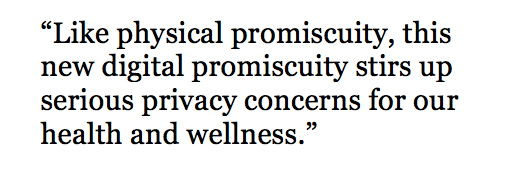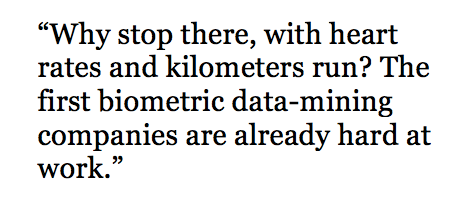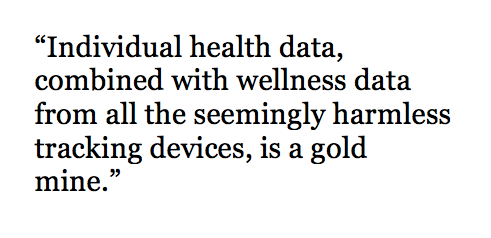By STEFFAN HEUER AND PERNILLE TRANBERG
An updated 2nd version the book Fake It! Your Digital Guide to Self-Defense has been released to coincide with a talk being delivered during South By Southwest in Austin, Texas on Sunday, March 10. The Daily Dot will be giving away 10 free printed copies of the new edition for the first 10 readers who RT our tweets related to this article. Follow us @dailydot to spot the tweets.
Just like the Kinsey scale for sexuality, there is a spectrum of our handling of digital identity. On one end of the spectrum, there’s the very private person who will never open a social media account, never share his or her location and protect their privacy as much as possible. At the other end is the so-called “datasexual,” the type of person who enjoys sharing data as much as David Duchovny enjoys a good roll in the hay. This is that person who obsessively shares their every move online, then tracks and measures the performance of what’s been reported.
Neither of these two extreme ends of the spectrum is desirable. But certainly a more mid-range, healthy focus on privacy is necessary. In the long run, this erosion of privacy will have dire long-term consequences on the individual. Jathan Sadowski described this very well in a recent article from The Atlantic:
“Privacy is not just something we enjoy. It is something that is necessary for us to: develop who we are; form an identity that is not dictated by the social conditions that directly or indirectly influence our thinking, decisions, and behaviors; and decide what type of society we want to live in.”
Like physical promiscuity, this new digital promiscuity stirs up serious privacy concerns for our health and wellness. Of course, openness can be good for us all, if used to further scientific goals and for improve predictive modeling. For example it allows expert systems to pool millions of data points almost in real-time to predict trends in public health. But vital data deserves privacy and anonymity; health issues can and will be used to discriminate against us, in areas such as job hunting, buying insurance and even basic economic transactions such as shopping for staples in your grocery store. In other words, the future of discrimination will revolve around the genetic cookies placed on the hard drive of your life. Try wiping those!
Sharing Exercise Info
Getting your entire body entangled in the “Internet of Things” starts innocently enough. Every heartbeat, every breath is a trickle of small data that is just waiting to be harvested and fed into the vast pool of Big Data.
Take a look around the online offers for fitness trackers and services. Up! from Jawbone. Nike Fuelband. FitBit One and Flex. DirectLife. RunKeeper. Basis Health. Misfit Shine. SleepCycle. Lark. Moves. The list of tools for tracking and sharing your exercise activities, vital signs and even sleep patterns is endless. To a certain extent, they are hard to live without once you’ve gotten used to them. Because they pretty much work.
 As behavioral experts know, something amazing happens as soon as you watch yourself and know that you’re being watched. The simple act of monitoring your own behavior inevitably encourages you to pay attention and develop better habits—to climb more stairs, bike instead of drive, run a little bit faster.
As behavioral experts know, something amazing happens as soon as you watch yourself and know that you’re being watched. The simple act of monitoring your own behavior inevitably encourages you to pay attention and develop better habits—to climb more stairs, bike instead of drive, run a little bit faster.
Tracking is only half the fun, since almost all apps and services have a default setting to upload your logs or make every activity public on services like Twitter, Facebook or Path. The privacy controls are usually not very detailed in that they only give you the option to turn the stream on or off. Little thought is given to the question who gets to see what details of your activities, or lack thereof.
Sharing Health Info
Exercise and sleep patterns are not the only things people track and share. Everything about health that you read and search for online, for example, tells Google and dozens of data collectors what health issues you are interested in, worried about or possibly suffering from. The Israeli company Treato, for instance, is using big data technology to comb through tens of millions of social media posts to flag reports and opinions about medications, their efficacy and side effects according to consumers.
On the surface, this sounds like a nice service for the good of patients. The back end, of course, is set to monetize their posts and search behavior for pharma companies to analyze and maximize. 
Why stop there, with heart rates and kilometers run? The first batch of biometric data-mining companies is already hard at work. They have names such as MC10, Proteus and Sano Intelligence and are bringing electronic band-aids or “stretchable electronics,” networked pills and microneedles to market. These wearable gadgets can track your hydration level, body temperature, brain activity or even dip into your bloodstream. Gathering user data for internal product development and making it accessible for interested third-parties is a key part of their business model.
Sequencing select high-profile parts of your DNA and sharing the results is another growing trend. One of the first movers in this area is 23andMe, co-founded by Anne Wojcicki, the wife of Google cofounder Sergey Brin. You spit in a tube and mail it off to the company. Six weeks later you get the test results via email. 23andMe.com’s website promises to provide insights into risk factors for 93 diseases, your predicted response to drugs and your ancestral origins.
Individual health data, combined with wellness data from all the seemingly harmless tracking devices, is a gold mine. When 23andMe opened its service to external parties via a so-called API last September, it received over 200 applications from developers who wanted to make genetic dating sites or combine genomics with personal data-tracking.
What happens if you can actually screen and even select people based on their genes? Mining of DNA results is something we will face in the future, as the technology gets cheaper and cheaper and becomes a mass-market phenomenon. Gattaca wasn’t that far off: genetic discrimination will soon be a reality.
The Health Hacker Movement
At the dawn of the era of ambient sensing and automatically collected health data, the positive seems to outweigh the risks. We witness movements of people who want to unlock their medical secrets, control and analyze their own health data. They call themselves members of the Quantified Self movement. This movement wants to arm everyone with better information to live a fuller and healthier life, or at least try—by keeping very detailed tabs on it. 
So why do we disagree with throwing the doors open to sharing all the data there is? Yes, there are upsides. But there are very real dangers. Many of these scenarios tend to presume the customer is healthy, young and active—hence deserving of a discount. In reality, bodies age and decay. There are plenty of ailments that bother us and which we don’t want our employer or insurance company to know. Health concerns, after all, are utterly private and first and foremost a matter of interest to your physician.
When everyone knows, people make decisions based on that knowledge. We fear for people losing their insurance or jobs. Most of all, we fear stigma. If society rushes headlong into a world where everything is shared by default, and lives are to be lived in public because the business models of certain tech companies say so, there will be serious collateral damage.
We are all, of course, free to do what they want with their private data. As long as they truly are in control over who knows what about them, where and in what context.
So do yourself a favor: Don’t put out like a datasexual. Practice safe privacy.
Steffan Heuer and Pernille Tranberg are authors of the book “Fake It: A Guide to Digital Self-Defense.” They cover technology and privacy issues in San Francisco and Copenhagen. In this series, Digital Self-Defense, Heuer and Tranberg report with updates from the digital identity wars and teach us how to defend our privacy in the great data grab going on all around us. Follow them at @FakeIt_Book.
Photo by timtak/Flickr


